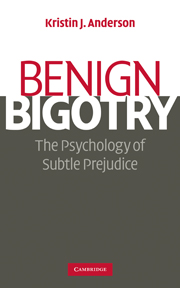Book contents
- Frontmatter
- Contents
- Acknowledgments
- Introduction: The changing place of prejudice: a migration underground
- 1 “Those people all look alike”: The myth of the other
- 2 “They must be guilty of something”: Myths of criminalization
- 3 “Feminists are man-haters”: Backlash myth-making
- 4 “Gays flaunt their sexuality”: The myth of hypersexuality
- 5 “I'm not a racist, I'm colorblind”: The myth of neutrality
- 6 “Affirmative action is reverse racism”: The myth of merit
- Conclusion
- Index
6 - “Affirmative action is reverse racism”: The myth of merit
Published online by Cambridge University Press: 05 June 2012
- Frontmatter
- Contents
- Acknowledgments
- Introduction: The changing place of prejudice: a migration underground
- 1 “Those people all look alike”: The myth of the other
- 2 “They must be guilty of something”: Myths of criminalization
- 3 “Feminists are man-haters”: Backlash myth-making
- 4 “Gays flaunt their sexuality”: The myth of hypersexuality
- 5 “I'm not a racist, I'm colorblind”: The myth of neutrality
- 6 “Affirmative action is reverse racism”: The myth of merit
- Conclusion
- Index
Summary
But Americans of all races and creeds, men and women, are disgusted with the system of reverse discrimination.
Former Governor of California, Pete WilsonAt the core of our shared belief in the American Dream is the assumption that basic qualities, valued widely in American society, will allow any individual to prevail. Pull yourself up by your own bootstraps. Hard work, determination, persistence, and dedication render any playing field level, goes the familiar narrative. It stands to reason, then, that those who do not succeed have only themselves to blame. The industrious rise through force of their own effort while the lazy founder on the rocks of failure because they lack the fundamental characteristics required for success. This is a dominant narrative in America.
How, then, does the controversial, often misunderstood principle of affirmative action fit into this narrative? Cherished narratives of this sort are tricky and full of baggage that encumbers our ability to think through social realities and policies. We often respond with a kind of reflex when something challenges our assumptions, and often we do not examine all the premises that underlie either our assumptions or the new challenge. Affirmative action is such a challenge, and it goes to the heart of some basic, if mythic, narratives that explain and govern our lives. A number of dangerous myths we live by and half-truths tend to obscure the real meanings of affirmative action and its potential to make the American dream an actuality.
- Type
- Chapter
- Information
- Benign BigotryThe Psychology of Subtle Prejudice, pp. 278 - 334Publisher: Cambridge University PressPrint publication year: 2009



